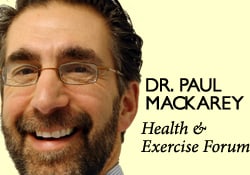
Get Off Your Butt!
A recent study published in the Journal of the American Medical Association (JAMA) found that the average daily sitting time in the USA has increased by almost an hour over the past decade. This translates to approximately 8 hours of sitting for teenagers and 6 ½ hours for adults in this country. The study found that more than 50% of kids and adults spend more than one hour of LEISURE time per day on a computer. Surprisingly, the greatest increase in sitting time was found among the “oldest” adults. These findings are particularly concerning when one considers the many other studies that have demonstrated the risks of prolonged sitting.
Research has repeatedly correlated the amount of sitting time per day to health problems. In fact, one study found a relationship between the amount of time an individual watches television to a decrease in their average life expectancy. Seriously, watching television and sitting is literally killing us. The Heart and Diabetes Institute of Australia conducted extensive research on sedentary behavior, including a review of almost one million people. They used actuary science, adjusted for smoking, waist circumference, and diet and exercise habits to assess the specific effects that the hours of sitting in a day impacts a person’s life span. They found that sitting too long results in a decrease in muscle contraction of the big leg muscles and because these unused muscles need less fuel, more unused glucose (fuel) is stored in the muscle. High glucose levels result in high blood sugar, which leads to adult onset diabetes and other health issues.
One Hour Sitting (TV) after age 25 = Decrease Life Span by 21.8 Minutes
One Cigarette Smoked after age 25 = Decrease Life Span by 11 Minutes
Six Hours Sitting (TV) over lifetime = Decrease Life Span by 4.8 Years
It is very important to note that exercise alone was NOT the solution. Even people who exercise 30 minutes 3-4 days per week or more, but watch more than six hours of TV, have the same mortality as a non exerciser who does NOT watch TV.
But, if you watch TV AND sit in a chair all day at work in a sedentary occupation, YOUR LONGEVITY IS SHORTENED DRAMATICALLY!
The average adult spends 50 – 70% of their non-sleeping life time sitting. Those with greater sedentary behavior (TV + Sitting Time), have 112% increase risk for adult onset diabetes, 147% increase for cardiovascular disease, 49% increase risk for premature death…even with regular exercise.
Exercise
Exercise is still very important, but you still must sit less and be active in between exercise time.
Limit TV Time
Make a conscious effort to watch less than 2 hours of TV per day. Join the lower risk group.
Get Off Your Butt While Watching TV
When you watch TV, get up and move during every commercial…stand, walk, march in place.
Get Off Your Butt At Office
Every 30 minutes get up and stretch, march in place, or walk for 3-5 minutes. Take the stairs instead of the elevator. Stand up during coffee breaks or when you‘re on the phone. Consider having meetings in which you stand up, use a standing desk or a work station which allows you to walk slowly on a treadmill while you’re working such as a TrekDesk.R (www.trekdesk.com).
In conclusion, don’t kid yourself. Exercise alone will not result in improved longevity if we eat poorly and sit around watching TV the rest of the time. It is about BALANCE…exercise, diet, stress management, and living an active lifestyle with more activity than inactivity. Shut off the TV and get off your butt!
NEXT MONDAY – Read Dr. Paul J. Mackarey “Health & Exercise Forum!”
Paul J. Mackarey, PT, DHSc, OCS is doctor of health science specializing in orthopedic and sports physical therapy. He practices in downtown Scranton and is an associate professor of clinical medicine at GCSOM.
This article is not intended as a substitute for medical treatment. If you have questions related to your medical condition, please contact your family physician. For further inquires related to this topic email: drpmackarey@msn.com